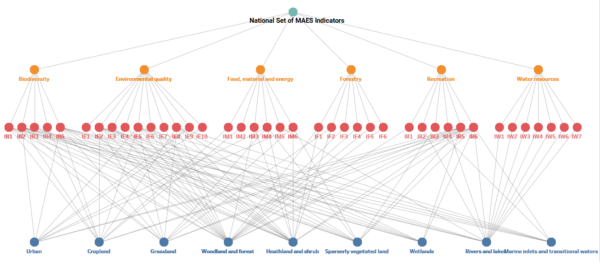
(De)codifying nature’s services to people
Ecosystem services are of paramount importance for nature protection. The more we know about the ecosystems’ status, the better our chances of ensuring effective protection for nature itself and for the benefits it offers us. Ecosystems in good condition are necessary for providing ecosystem services which, in turn, enhance human well-being. The recognition that humans benefit from effectively protected nature lies at the heart of the Natura 2000 network’s philosophy.
It is in this respect that a new tool has been developed in the frame of the LIFE-IP 4 NATURA project. This tool is the National Set of Indicators for the Mapping and Assessment of Ecosystems and their Services (MAES) implementation in Greece. As a result of this collective effort we are now better “equipped” to comprehend the services provided by ecosystems and to design the necessary measures. How exactly will this set of indicators help?
The development of indicators for determining and interpreting the condition of ecosystems and their services significantly contributes to: a) scientific documentation and knowledge; b) increasing visibility; and c) awareness raising about natural capital and its importance in providing and maintaining ecosystem service flows. Indicators are key tools for interpreting and communicating the various features of ecosystems that need to be considered when designing and implementing natural resource protection and management measures.
As part of the LIFE-IP 4 NATURA project, Greece is currently developing and implementing a MAES nation-wide program based on the region’s unique characteristics following the proposed methodologies by the European Commission. A series of steps were followed in order to compile standardized MAES indicators for Greece that include: (a) collection and review of the available MAES-related datasets, (b) shortcomings and limitations encountered and overcome, (c) identification of data gaps and (d) assumptions and framework setting. Correspondence to EU and National Strategies and Policies were also examined to provide an initial guidance for detailed thematic studies.

The research team followed the requirements of the EU MAES framework for ecosystem services and ecosystem condition indicator selection. Ecosystem services reported under the selected indicators were assigned following the Common International Classification of Ecosystem Services. Spatial analysis techniques were applied to create relevant thematic maps.
A set of 40 MAES indicators was drafted, distributed in six general indicator groups, i.e., Biodiversity, Environmental quality, Food, material and energy, Forestry, Recreation and Water resources. The protocols for the development and implementation of an indicator were also drafted and adopted for future MAES studies in Greece, providing guidance for adaptive development and adding extra indicators when and where needed. Thematic maps representing ecosystem services (ES) bundles and ES hotspots were also created to identify areas of ES importance and simultaneously communicate the results at the national and regional levels.
The National Set of Indicators to be implemented in the frame of the LIFE-IP 4 NATURA project was based on the typology and the classification proposed by the Common International Classification of Ecosystem Services (CICES). This set of indicators sets the national basis on which future studies will be conducted for MAES reporting for the achievement of the national targets within the National and the European Union (EU) biodiversity Strategy.
The National Set of MAES Indicators was recently published for the first time as a scientific research paper in the latest special issue of the Forests international journal and is available here.
